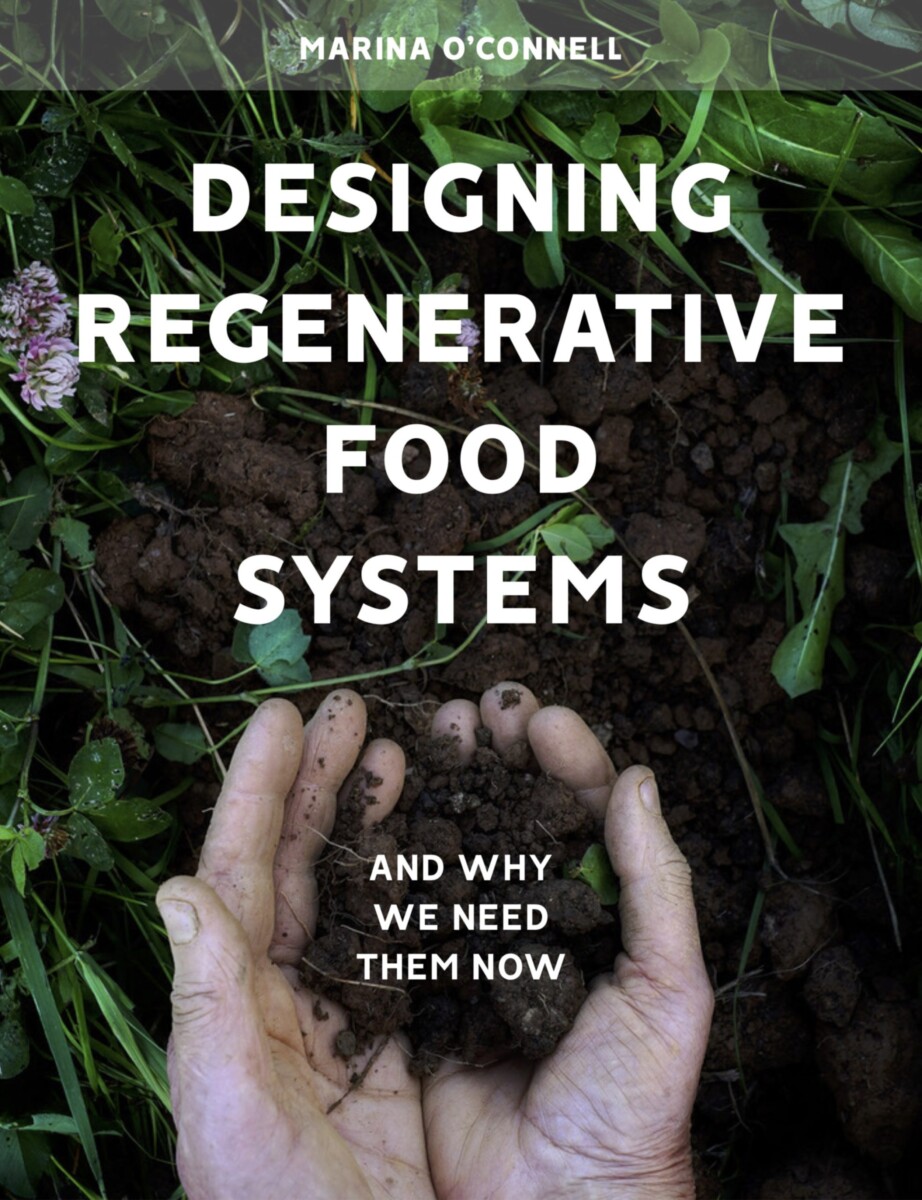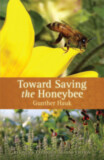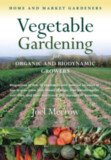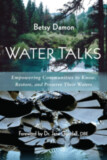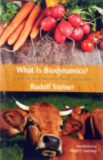Designing Regenerative Food Systems
And Why We Need Them Now
- Publisher
Hawthorn Press - Published
17th June 2022 - ISBN 9781912480548
- Language English
- Pages 228 pp.
“We’ve got climate change in real time now and I think farmers are also aware the weather is changing. The increase in nitrogen fertilizers has just woken up everybody to the urgency of it. So, what was a transition that was going to happen over maybe ten years has suddenly been accelerated.” —Marina O’Connell
This book offers a unique toolkit for designing regenerative food-growing systems through tried and tested agroecological methods for transforming industrial food growing into a resilient agricultural revolution. This is a system that grows good food from healthy soil in a low-input, closed-loop system. Marina O'Connell identifies and addresses the four challenges of climate-change, mitigation and adaptation, offsetting biodiversity loss, and producing enough good food for a growing population.
Using the case study of her Huxhams Cross Farm in Devon, England, O'Connell shows how dead soil was transformed into thriving, fertile land while drawing on a toolkit comprising the methods of biodynamics, organic agriculture, agroforestry, regeneration, agroecology, and permaculture. The principles, methods, and techniques of each approach are explained concisely, with illustrative case studies of successful endeavors and follow-up resources such as film references.
Marina O'Connell concludes with the Huxhams Cross Farm case study and research evidence. She reviews the extent to which the four challenges are tackled successfully by the “toolkit,” how a resilient farming revolution can be brought about through food choices and policy that tackles barriers such as land access and the psychology of scarcity, and showing how to build farmer capacity for a resilient food-growing transition.
“Designing Regenerative Food Systems is an outstanding book in its field. Marina O’Connell, the author, is a lifelong practitioner of regenerative ways of growing food. This book is a distillation of her profound experience and wisdom, which she has accumulated over many years of dedicated work and unwavering commitment. She weaves together many tried and tested methods of growing food in an ecologically sound systems such as biodynamic and organic ways, including permaculture, agro ecology, and forest gardening. The book is a great guide to good gardening and a handbook for meaningful farming. This is a book of rare inspiration and insights. I can wholeheartedly recommend it to all gardeners and farmers, as well as to everyone interested in wholesome and nutritious food.”
— Satish Kumar, founder of Schumacher College and editor of Resurgence & Ecologist“A powerful and personal book about transforming the land for the better. Marina O’Connell weaves inspirational stories of redesign and transformation, showing how regenerative methods for agriculture and food have come to life. In half a decade, she created a productive, diverse, profitable and regenerative farm from depleted soil, and has said, over here is a path, now we can walk it.”
—Prof. Jules Pretty, author of The East Country“Marina O’Connell is a practical possibilist...a weaver of integrated agro-ecological systems that regenerate the soil under our feet and the food on our plates. She convincingly makes the case—in this most timely of books—for how agricultural practices that grew up on the fringes of our dominant industrial food system can help shift contemporary food culture to an agro-ecological paradigm that benefits both people and planet.”
—Jonathan M. Code, lecturer in sustainable land management, Royal Agricultural University, and author of Muck and Mind: Encountering Biodynamic Agriculture“This book should be seen as a primer for everyone entering the food and farming debate, as well as those who want to broaden their perspectives.’
—Julia Wright, Associate Professor, Coventry University and chair of the Biodynamic Association“The strands Marina has succeeded in weaving together—including the psychological support for people connected to the farm, the creative local marketing, and the collaboration with local businesses—are all wonderful threads in what I see as the establishment of a model local food economy.”
—Helena Norberg-Hodge, founder and director of Local Futures“It is hard to underestimate how profoundly important the urgent and ambitious reimagining of food and farming systems is, how we might do so in ways that are regenerative, restorative, and transformative. How to create farms and gardens that build soil, community, and possibility? This book is your opportunity to learn from a master. What Marina O’Connell has created at the Apricot Centre is nothing short of miraculous. In these precious pages she shares everything you need to know in order to do the same.”
—Rob Hopkins, co-founder of the Transition movement and author of From What Is to What If“Few people have attempted to survey the different strands of sustainable agriculture, but Marina has done so in a really valuable way, showing the links and crossovers between the different techniques along with some good science and other references.”
—Martin Crawford, director of Agroforestry Research Trust“Nature works not just because it is diverse, but also because it is made up of relationships among the many elements. So it is with regenerative agriculture. No single approach has all the answers, but by weaving them together, forming relationships, we create a whole systems approach that works for people and planet. Marina has done a great service for students, farmers and growers, and everyone with a passion to bring land and community to life. She has shown how we can connect disciplines and approaches, basing this not just on theory, but also on her extraordinary farm at Huxham’s Cross. Highly recommended!”
—Andy Goldring, director, Permaculture Association, UK“Hope for the future of humanity and wild nature lies not with governments, corporates, and international conferences but with grassroots movements—especially in food and farming. Marina O’Connell is a farmer and an educator. This excellent regenerative farming design toolkit of what’s already in train worldwide is just what’s needed for the coming agro-ecological revolution.”
—Colin Tudge, co-founder of the Oxford Real Farming Conference and the College for Real Farming and Food Culture“Marina O Connell has helped our family farm become more sustainable. Within the partnership, she has helped redesign a ten-acre field into biodynamic conversion, with a rare and valuable combination of deep experiential and practical insight drawing on this regenerative toolkit for horticulture, farming, and community life with the land. We value her skill in weaving together different approaches to agroecology, including permaculture, organic practices, and biodynamic methods, which are so well explained in this timely handbook.”
—Dr. Miche Fabre Lewin and Dr. Flora Gathorne-Hardy, Great Glemham Farms, Suffolk, UK
Marina O'Connell
Marina O’Connell (1961–2024) was a successful grower, farmer, and educator. Born of seven generations of Dutch nurserymen from Boskoop in Holland (famous for fruit trees), she celebrated the professional women who are pioneering the transition to resilient food production and to re-localizing our food economy.
O'Connell, the Apricot team, and her family turned the bare land at Huxhams Cross Farm, Totnes, Devon, UK, from “a miserable bit of land” (as a local farm contractor called it in 2015) into a productive, beautiful, community-connected, and profitable farm.
She action-researched the use of biodynamic, organic, permacultural, agroecological, regenerative, and agroforestry methods in her work. She always led by example. People from around the world have visited her farm and joined her courses and her Devon apprenticeship program for regenerative food systems. She was consulted by farmers, who asked her to help redesign their farms away from industrial farming, and by farm estates needing help to make a successful transition to resilient food systems by 2030.


